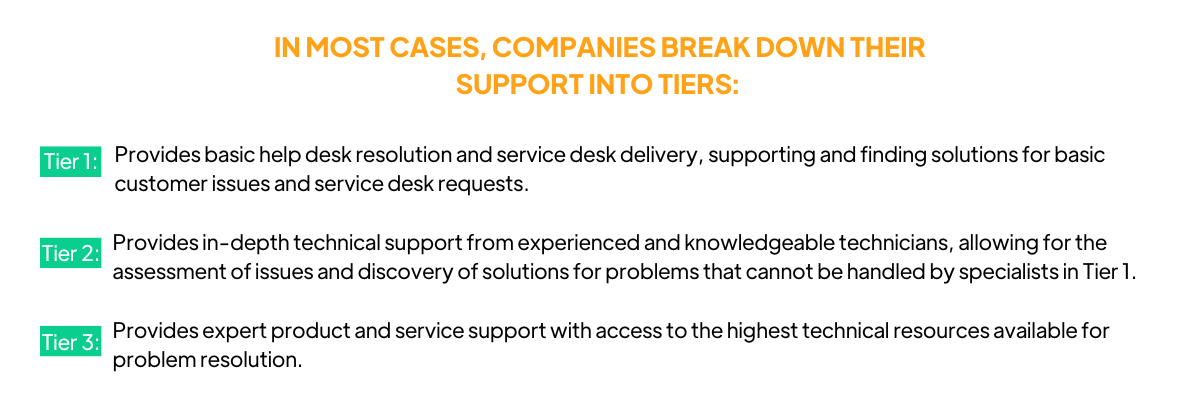
Technical support is an important part of any company. Its main goal is to help customers who are dealing with technical challenges, while also helping maintain the company’s reputation as a consumer-centric organization. However, very often, companies do not have the internal resources to provide their customers with outstanding experiences. This is why a lot of businesses choose IT support outsourcing to overcome all the challenges involved with setting up an in-house tech support team.
In this article, we will take a closer look at outsourced technical support, so you can make more of an informed decision about whether it is right for your company.
Table of contents:
1. What is Technical Support Outsourcing?
2. How Outsource Tech Support Works
3. There are also drawbacks to outsourced IT services
4. Why Choose Tech Outsourcing Over In-house
5. Different Levels of Tech Support
6. How to Choose a Tech Support Provider?
7. Trust Pexly With All of Your IT Tech Support Needs
What is Technical Support Outsourcing?
Technical help desk outsourcing is hiring offshore tech support agents to help you manage inquiries from your customers. This can be hiring an additional agent to expand your current in-house team or setting up an entire dedicated offshore tech support team. While this may sound like something that is difficult to do, everything is easy if you partner with the right outsource technical support company. They will help you achieve all the benefits this support model has to offer.
There are various channels through which outsourced agents can provide tech support, such as phone, email, live chat, and others.
Now that we got a general overview of outsourced tech support, let’s move on to how outsourced technical support services work.
You may also like: Best Help Desk Software Solutions for a Better Customer Experience
How Outsource Tech Support Works
The best IT support outsourcing services will make the process really easy. They will collect all the information about your specific needs and will provide some recommendations on how the team should be assembled. You will have full control over the size of your team and will be kept up to date on how the team is progressing toward its KPIs. Outsourcing IT support allows you to access the following:
- A solid remote workforce with technical knowledge, skills, and expertise. Outsourcing gives you access to the best pool of candidates a particular location has to offer.
- Networks and systems for configuring and maintaining devices. The outsourcing provider will be responsible for maintaining the networks and systems needed for agents to complete their work.
- Hardware and software for continuous business operations. Outsourcing companies usually buy the best equipment for their agents so that they can focus on providing the best possible support instead of worrying about the tools they use.
- System monitoring for performance, security, and compliance. The IT outsourcing provider will be responsible for collecting metrics and assembling reports to show their products and the value they provide.
It is also worth noting that tech support outsourcing can be beneficial, especially for startups and small businesses. The reason for this is that when companies are just starting out, they usually don’t have the human resources to cover all the bases. For this reason, internal employees will need to wear many hats. For example, you might have a developer having to answer basic support questions, which is certainly not a good use of their time. By outsourcing tech support, companies can free up their internal teams to focus on their core business functions.
There are also drawbacks to outsourced IT services. These include:
- Less control over data security. You will need to give access to the outsourcing company to your CRM system and other tools containing customer data.
- Time zone difference may cause communication issues. Very often, the time difference between the US or EU countries and the outsourcing provider will be ten or more hours. This makes it difficult to communicate.
- Less internal familiarity. You have to make sure that your outsourcing team is well-versed in your business and its infrastructure prior to onboarding for a smooth transition.
Why Choose Tech Outsourcing Over In-house

Although outsourcing was once considered a tactical solution, businesses have now adopted the practice as a common way to reduce costs, streamline technical support departments, and provide convenient, consistent customer support. Hiring IT support outsourcing companies certainly offers a lot of benefits for both companies and their customers. Below are some of the most popular reasons why so many businesses choose to outsource their tech support:
- Reduced costs. According to Deloitte, cost savings is the top outsourcing reason amid the pandemic. It topples other common business objectives such as flexibility and agility. You can save on labor and production expenses when outsourcing technical support.
- Advanced technology. Technical support usually deals with troubleshooting and fixing complex IT products and electronic devices. It demands the best infrastructure, the latest technologies, and updated resources. You get instant access to these vital resources when outsourcing. You can optimize your technical support function and scale your business.
- 24/7 support. Most tech support outsourcing providers offer 24/7 support. They have a team of representatives working on shifts. Outsourcing provides a tech support team ready to help your customers with technical problems. Whether you outsource data entry services, customer service, or technical support, consider a 24/7 BPO company.
- Easy scaling. The top outsourcing companies on the market will make it easy to scale your team without sacrificing the quality of support. Best of all, the service provider will be responsible for recruiting, training, and other processes involved in onboarding new teammates.
Different Levels of Tech Support

IT support level tiers are essential in a business’s operations today. The scope of the support tiers in IT can vary greatly depending on the company and benefit the internal organization and its customers. As a best practice, it’s recommended to outsource your IT support to provide the best level of support.
How to Choose a Tech Support Provider?
The market is full of companies who are offering a wide range of services at competitive prices. Going to choose the best among all can be cumbersome. While propelling the growth of the business, the right foundation matters a lot. When evaluating outsourcing providers, there are several things you should be on the lookout for besides the price. Take a close look at their experience and key support metrics such as CSAT and FCR. Ask them about case studies and how they were able to solve complex tech support issues.
Another thing to consider is whether they have enough people already on staff and how long it would take them to recruit agents with the necessary level of expertise. An experienced outsourcing provider will be able to show you the many different channels they use for recruiting and possible timeframes for putting your team together.
Below is a list of some additional criteria that need to be considered while choosing the right technical support outsourcing vendor for your company.

1. Company’s experience & expertise in your field
One of the first things you should ask about is the company’s experience. This includes how many years they have been on the market and the types of tech support projects they have actualized in the past. For example, ask them how quickly they can assemble a team and provide some case studies about technical support projects. It is usually better to prefer larger service providers since they will be able to launch your project quickly since they can simply shift around human resources internally.
2. Compare Rates
Before deciding on the technical support outsourcing vendor, comparing the prices of each company against their plethora of services and understanding their quality of services and terms & conditions are important. Don’t get trapped on the lowest price, as other factors need to be considered. Always remember, the lowest prices do not mean that there are no hidden costs, and you will get high-quality prices. Check the transparency of the prices and compare the services that are offered within that price range, and select the one where you get the best rate.
3. Ask About Data Security and Privacy
Last, but certainly not least, let’s talk about security and compliance. When you outsource certain tasks, you are trusting the service provider with some sensitive information about your business, products, or services. You need to be confident that this information will not leak into the hands of your competitors. Ask the service providers about what safety measures they have in place to make sure that your and your customer’s data remains secure.
4. Find Out What Services They are Willing to Provide
Be wary of a company that claims to “support everything” without actually going into any detail about what is included. Too often, companies think they have a complete cover but discover they can only log a set amount of support tickets a month, or there’s an extra charge for certain services. It is better to be clear from the outset on exactly what level of support you would be getting. Otherwise, you risk getting tied into an unsuitable contract. If it turns out that what you were considering isn’t quite right, you can always ask whether there are different levels of support.
You may also like: Start Reaping the Benefits of Outsourced Tech Support
5. Learn About Their Processes
Once you have narrowed down the field to a few potential vendors, it’s time to get in touch and learn about how they work with their business clients. How much time will they spend working with you to learn about your products? How much feedback will you receive regarding customer satisfaction for every call or interaction? How transparent is the communications process? Make sure that you’ll have the opportunity to state your concerns and have them addressed in regular phone meetings, and that you’ll receive detailed feedback regarding the company’s interactions with your business customers.
6. Set Clear Goals and Expectations
Often, expectations will not match reality, which is something a hire must come to terms with early on. However, this is not a call to settle for the mediocre, as there are truly fantastic firms out there. Before choosing our business partner, set a reasonable performance level in every benchmark that is important to you so that it is easier to make a match. Try to establish early on what benchmarks are your negotiable and which ones are non-negotiable. Doing so helps you know where you can make compromises and therefore avoid disappointment.
7. Make Sure They Have the Needed Infrastructure
IT infrastructure is a broad term that covers several facets of your organization’s operational technology setup, such as phone systems, fast internet connection speeds, internet circuits, and a lot more. It also refers to the way that your IT system as a whole is designed and implemented, including how you host, protect, and recover your organization’s data.IT infrastructure outsourcing is essentially delegating the management of your setup and systems to an IT provider.
Trust Pexly With All of Your IT Tech Support Needs
Businesses of all sizes have turned to technical support outsourcing as a strategic, cost-effective solution to customer service. The low cost of outsourced staff and 24/7 access to assistance allow businesses to consistently increase client satisfaction ratings while improving their bottom line. In addition, businesses can reallocate assets to the core functions that give them a competitive advantage.
Providing your customers with the needed levels of tech support is one of the most important aspects of your overall support services and should not be trusted by simply any service provider. Pexly has more than eight years of experience in actualizing tech support projects of various sizes and complexities, and we can offer you a solution based on your specific needs.
Contact us today to learn more about how we can help you.



